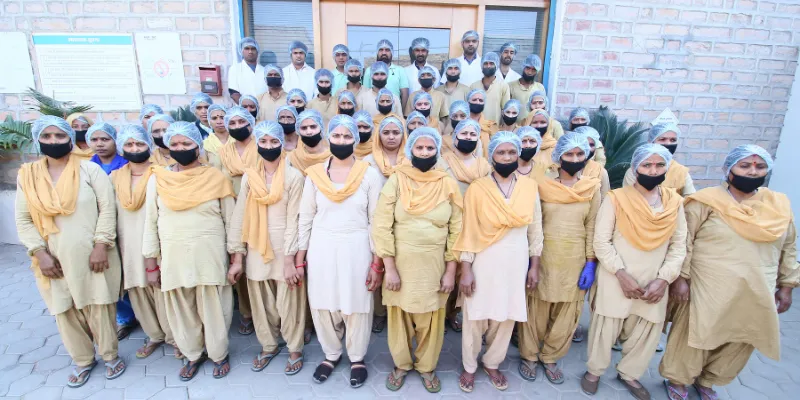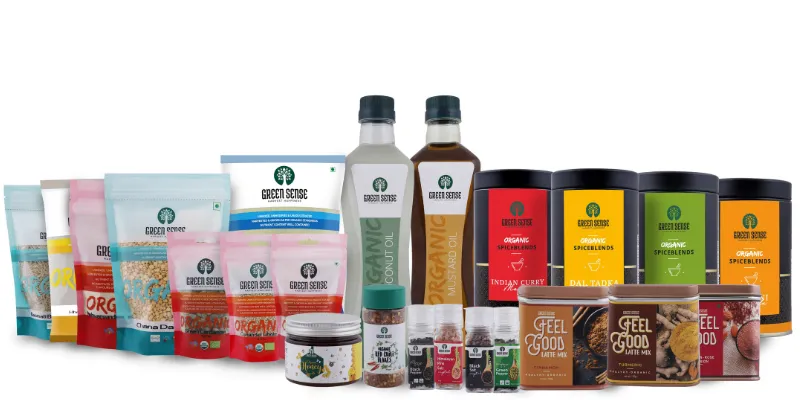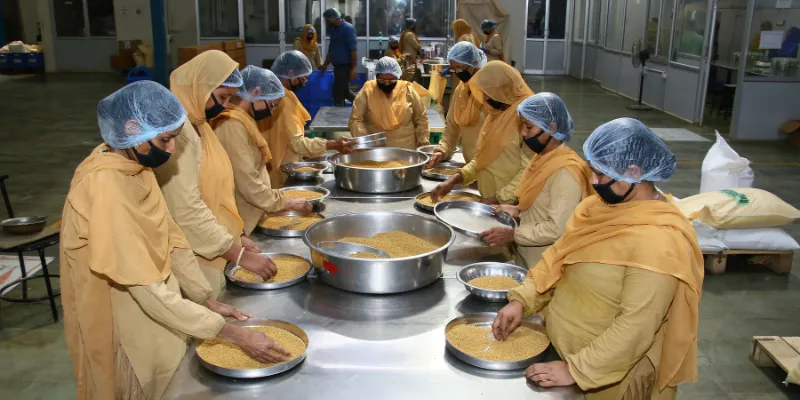Meet the man who built an organic food company with Rs 3 lakh savings; is now eyeing Rs 40 Cr turnover
In 2009, Siddharth Sancheti started Jodhpur-based Agronic Foods, which works with 40,000 farmers to enable organised, organic farming. It produces a range of organically-grown spices, herbs, grains, cereals, flours, cold-pressed oils, and more.
When his loved one was diagnosed with cancer, Siddharth Sancheti started believing in the need for leading a healthy lifestyle. According to him, consuming organic and sustainable food was the first step in leading a healthy life.
When the Jodhpur-based budding entrepreneur visited farms, he observed a high degree of depletion of soil quality. This compelled him to start an organic farming business that produced healthy farm foods in a sustainable manner.
In 2009, Siddharth and his brother Mohnish Sancheti started Agronic Foods, which works with farmers to enable organised, organic farming. The company also ensures the processing and retailing of farm produce is done with adherence to quality norms.
“Back then, there were not many companies that were doing this. Today, we work closely with 40,000 farmers for producing organic food. Our products only come from organic growers and harvesters, each of which is certified and help preserve the soil profile and biodiversity,” Siddharth says.
This year, the 150-employee organisation is expecting a Rs 40 crore turnover.

The Agronic Foods team
In an interview with SMBStory, Siddharth describes Agronic’s business model and its organic food products.
Edited excerpts from the interview:
SMBStory [SMBS]: How did you gather the resources to start? How much was invested?
Siddharth Sancheti [SS]: The business is self-funded from the beginning. I started with Rs 3 lakh from my personal savings. I had the option of getting funds from my family, but I used my savings because I wanted to work on a low-cost model and grow the business gradually.
Our approach has always been to use capital in the right way, i.e., in a way that gives us the maximum return on investment.
SMBS: What were your initial challenges? How were they solved?
SS: The first three years were full of struggle. Back then, organic food was a new concept. Not many people had an idea of what it was. We faced difficulties in sourcing, certification, transportation, etc. Initially, it was difficult to convince and train farmers to grow organic food for us.
It took six months to crack the first deal. Survival has been the biggest challenge since then, as the industry was largely unexplored. But we survived by doing one thing at a time and facing challenges with the attitude of never giving up.
As a founder, I also had to find the right balance between getting involved in every operational stage and giving people a free hand where required.
SMBS: What is Agronic’s business model?
SS: We are producers, processors, and sellers of organic food. We manage our produce from the farm level to dispatch, making our product prices competitive. Our first step is the conversion of land from conventional to organic, and the formation of a farmers’ cooperative.
Thereafter, we extensively train the farmers. They grow the crops as per our demand and we buy back all of it. We process them in our facilities and pack them for resellers, importers, and distributors.
This farm-to-fork approach gives us a high degree of quality control. We also employ fair pricing methods as there are no middlemen involved.
We also have a ‘no questions asked’ return policy where customers can return any products in case of quality issues. Bulk returns are difficult for many companies but we are stringent in our product quality norms that this same return policy applies to all our buyers.

Agronic Foods' products under its Green Sense brand
SMBS: What are your different organic food products and why are they unique?
SS: We offer a range of organically-grown spices, herbs, grains, cereals, flours, cold-pressed oils and more. The manufacturing happens in our facilities in Jodhpur, Rajasthan, and Mahua, Gujarat.
Our products address the biggest problem of the food industry: adulteration, excessive utilisation of chemical pesticides and unhygienic processing and storage. These result in a number of health issues like cancer, low immunity and other lifestyle diseases, and also deplete soil quality.
Our organic farming process ensures no chemical and synthetic fertilisers or preservatives are used at any stage. The process is completely hygienic and monitored at every step. Every grain can be traced back to the farm where it was grown. We have multiple food and quality certifications such as BRC and HACCP.
Considering all these factors, our pricing is a little higher. Customers are paying for the product without any fillers.
SMBS: How does growing farm produce and selling it to Agronic benefit farmers?
SS: We buyback the entire produce of farmers, and so, they do not have to go to middlemen or worry about selling their produce. We pay a premium on top of market price so that more farmers are motivated to grow organic food for us.
We also train them at every step, right from tilling the soil to post-harvest. Besides this, there are cooperative heads that provide assistance to farmers.
Another advantage is that organic farming improves soil fertility. Farmers’ land, which would otherwise become barren due to excessive use of pesticides, remains healthy for generations if organic farming is done.
In conventional farming, farmers can suffer from respiratory and skin disorders due to excessive contact with chemicals. Organic methods are natural and do not inflict any disease on the farmers.
We have also tied up with Seva Mandir, an NGO from Udaipur, to run Shiksha Kendra - schools for local farmers. These kids have never been to school as they live in remote locations. They also get mid-day meals in association with Akshaya Patra Foundation.
SMBS: Who is your target audience and what is the strategy to reach them?
SS: Our target audience on the B2B front comprises organic food importers, food processors, distributors, retailers, pharmaceuticals, tea blenders, health food stores, and the food services industry.
On the B2C front, our target is people aged between 25 and 45, who are well-educated and health-conscious.
Our marketing strategy is showing organic is the better choice due to its numerous healthy advantages. We educate customers about the same through our posts on social media. We also show and strengthen their trust by showing the practices we follow.
We also do collaborations with nutritionists to educate the audience about the multifold benefits of organic food.
For retail, we have our own website, and we also have a presence on Amazon, Qtrove, MensXP, LBB, Tata Cliq Luxury, and Brown Living, etc.
Our competitors are other organic food exporters. We stay ahead by evolving to the changing market demands and having transparent windows with our customers. We also keep a close check on the global market and are proactive with our products and service offerings.

Inside the Agronic Foods facility
SMBS: How did COVID-19 impact Agronic and what are your future plans?
SS: For the organic food industry, COVID-19 has brought many opportunities. People have started focusing on health and nutrition. But it's a sad reality that it took a pandemic for people to focus on their health.
We are now seeing worldwide demand for Indian spices and ayurvedic herbs increasing manifold. In India, we see an overall increase in demand for organic food.
We expect demand to grow by 100 percent in 2020-21, 60 percent in 2021-22 and 40 percent in 2022-23. Our expansion plans for this year include setting up a new processing unit in India. We also want to build warehouses in North America and Europe for better distribution and market penetration.
We are also looking to increase our farmer base to 50,000 and involve state governments and NGOs at the ground level.
Edited by Dipti D





1551791705233.png?fm=png&auto=format&h=100&w=100&crop=entropy&fit=crop)




